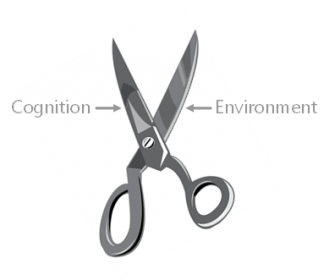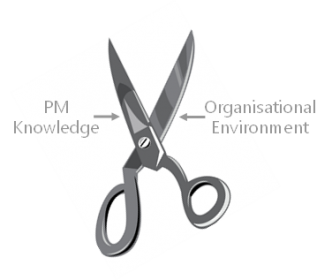Ian Clarkson: Can You Cut It In Project Management?

If I said the name “Malcolm Gladwell” how many of you would recognise it?
He’s written some bestselling books: Tipping Point, Blink, Outliers, What the Dog Saw, David and Goliath, and is an author of the same genre as people such as: Tim Harford, Dan Ariely, Charles Duhigg, and Michael Lewis to name but a few (all authors I fully recommend, by the way).
It is the book “Blink” that is the inspiration for this article which talks about how people make instant/snap decisions. Some of the underlying theory of “Blink” is taken from another book called “Gut Feelings1” and it was when I was reading this that my favourite analogy of how to make project management work in an organisation was coined.
“Just as one cannot understand how scissors cut by looking at only one blade, one will not understand human behaviour by studying either cognition or the environment alone”
What this is saying is that if you want to understand human behaviour it is not enough to understand independently i) how the mind works, and ii) its environment – you need to understand how the mind interacts with its environment. It is the interaction between the two blades that makes them characteristic of scissors (see left hand image).


What has this got anything to do with making project management work? Well, I consider that to make project management work in an organisation, it is not enough to understand independently i) project management knowledge, and ii) the organisational environment – you need to understand how project management knowledge interacts with your organisational environment (see right hand image).
For example, come on any project management course and you’ll discuss typical roles on a project: Sponsor, Project Manager, Senior User etc, yet I’ve not met an organisation which implements these roles exactly as the book says – to implement project governance correctly requires knowledge of your organisation in which the project will operate as the levels of decision making and authority will be different in, say, the financial sector to the public sector.
In this example, PM Knowledge = understanding of the role of the Sponsor, Project Manager, Senior User etc, whereas Organisational Environment = your company and industry. Understanding these independently will not make project management work – it’s the interaction between knowledge and the organisation that matters.
So, I rephrase the statement above:
“Just as one cannot understand how scissors cut by looking at only one blade, one will not understand project management by having knowledge of the subject or the environment alone”
I talked about this analogy at a conference last year and at the end I got asked a very valid question “how much does a project manager need technical knowledge of the project?” That is, how much does a project manager need to know about (e.g.) IT, Construction, Health in order to run IT, Construction, Health projects, as my discussion above makes no reference to any technical understanding of the project manager.
I forged my project manager career in the automotive industry and I can reliably state that I know nothing about how cars work. Did I need to have a good understanding of engines and powertrain to run projects in this industry? My view is no. I am running a software project at the moment, and I get communications from the supplier about some really granular technical details.
I don’t understand these technical details (ask anyone in my team) – I guess I am a ‘conscious incompetent’ – so my team includes people who do have the technical knowledge and I liaise with them. I like to think I know something about project management, and how my own organisation operates – the two blades of the scissors. The technical details I can find out about.
Think of it another way, could I be a project manager in your organisation? This is a question I regularly ask organisations when discussing this analogy. Overwhelmingly, the answer is ‘yes, as whilst I may not know the structures, policies and procedures of your company I can get to know these relatively easily and quickly.
What are you looking for in a project manager? Experience of running different sizes and complexity of projects? Or experience in running specific technical projects? Or both? I have experience of running £multi-million projects in the automotive industry – surely this counts for something other than just car technical knowledge?
So, how do you ‘sharpen each blade’ and build capability and competency in project management? Starting with the ‘PM Knowledge blade’, training is the obvious option here: PRINCE2, APM, PMI etc. These are generic (by definition) and build knowledge in the subject – how do we ‘sharpen the ‘organisational environment blade’, and crucially make the two blades interact?
Competency assessments are a good option to fuse knowledge with the organisational environment – what I see with a lot of companies is competency assessments that are a hybrid of generic project management areas (risk, planning, quality etc) and some organisation-specific ones (e.g. procurement, company behaviours, values, governance).
I like this approach as people have to evidence how they have put their knowledge into practice in their organisation. Then, targeted development can be put in place via, for example, a career framework, learning interventions, coaching and mentoring. The list can go on.
To find out more about how QA can help build your capability and capacity in project management, drop me a line at: QAL.OrganisationalConsultancy@qa.com.
1Gerd Gigerenzer (2007) (and references cited therein), Gut Feelings, Penguin Books. ISBN: 978-0141015910




